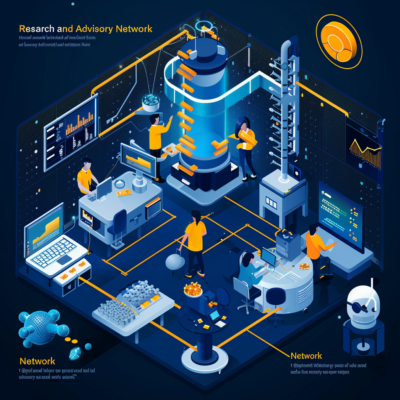
IIA’s Research and Advisory Network (RAN) clients leverage battle-tested frameworks and an exclusive network of active practitioners and unbiased experts 150+ strong to execute strategic enterprise data and analytics initiatives. We regularly check the pulse of trending topics for the RAN community and facilitate critical conversations in virtual roundtable format for peer-to-peer exchange.

Research and Advisory Network
Get access to the leading network of independent analytics expertise, allowing you to apply real practitioner insights against initiatives, projects, and problems.
In recent roundtable discussions with IIA RAN clients, data and analytics leaders from diverse industries gathered to share their experiences and strategies in implementing generative AI (GenAI). These conversations covered a wide range of topics, from leadership roles to governance, risks, talent acquisition, ethical considerations, legal challenges, and the practical application of GenAI technologies. These discussions were moderated and summarized by Mina Meman, Director for Client Success, IIA. Here are the key concepts that emerged from these discussions:
1. The Role of the Chief AI Officer (CAIO):
The need for a CAIO varies depending on the organization's existing infrastructure and layout. In some cases, a senior director reporting to the chief data officer (CDO) may suffice, while in others, a strong central AI leader is essential. This leader typically works with business leads across different sites to prioritize use cases. However, the success of a CAIO depends heavily on their partnership with the rest of the business, as well as their ability to navigate potential tensions with other C-suite roles.
2. GenAI Champion Role:
Some organizations have appointed an internal GenAI champion to oversee readiness and adoption. This role involves soliciting ideas, tracking effectiveness, and working with finance to quantify ROI before moving use cases into production. A centralized resource is emerging in decentralized groups to inform the broader enterprise about GenAI capabilities and increase data literacy, providing governance and strategic oversight.
3. Risks and Concerns:
Participants expressed concerns about the potential for GenAI to undermine the need for data scientists, especially in highly regulated industries where AI solutions must be explainable. The fear of unleashing powerful code-interpreter capabilities to non-analysts was also highlighted. To mitigate risks, firms are focusing on regular training and emphasizing the iterative nature of the technology.
4. Talent Acquisition and Strategy:
Finding the right talent, especially AI architects, remains a challenge. Organizations are exploring whether to grow their own "unicorns" or hire externally. Data science teams are expected to include GenAI in their toolkits, with a focus on moving projects into production efficiently.
5. Funding and Prioritization:
Securing funding for GenAI initiatives is challenging, especially given the current hype around the technology. Organizations are seeking champions from the C-suite and following a structured approach to align priorities, architecture, and eventually move into production. There is a trend toward centralizing the GenAI strategy, even in traditionally decentralized organizations.
6. Impact on Data Quality and Literacy:
While GenAI may not directly solve data quality issues, it has sparked renewed interest in analytics among leaders and stakeholders. The technology is seen as a tool to highlight the importance of data literacy and quality within organizations.
7. AI Ethics and Bias:
Organizations are adopting diverse approaches to address AI ethics and bias. While some have established robust frameworks for model risk management and AI governance, others are still in the process of developing their strategies. The debate revolves around whether to opt for off-the-shelf solutions or to craft bespoke strategies tailored to specific needs.

A Comprehensive Guide to Responsible Analytics Governance
In order to guide you on your digital ethics journey, experts at IIA have crafted a complimentary version of our research brief, "A Comprehensive Guide to Responsible Analytics Governance." This brief lays the foundation for operationalizing analytics governance across all business functions in the enterprise.
8. Legal Considerations:
The legal landscape surrounding AI usage is complex, and organizations are taking measures to navigate it effectively. These include implementing acceptable tool lists, tracking usage, and communicating risks effectively to ensure compliance and mitigate legal challenges.
9. Best Practices and Preventing Misuse:
Ongoing development and training are crucial to enforce best practices and prevent misuse of AI tools. Mandatory training programs are being implemented to educate employees about data and AI tools, with access to AI tools provided post-training. Monitoring tools are being developed to control the input and output of AI models, and digital rights management is being utilized to regulate document sharing.
10. Marketing, Content Generation, and Customer-Facing Applications:
The use of GenAI in content generation and customer-facing applications requires clear legal and regulatory guidance. Governance processes are essential to ensure responsible utilization of AI tools. There are additional concerns regarding the risks associated with customer-facing applications, particularly in safety-critical industries.
11. Mitigating Inaccuracies:
Concerns regarding the accuracy of generative AI were raised, with some participants sharing strategies for improving the technology. The consensus leaned toward the necessity for further exploration and discussion on mitigating inaccuracies and enhancing the technology.
12. OpenAI Chat Interface:
Insights were shared regarding the customization and security measures employed for OpenAI chat interfaces within organizations. The significance of data security and ensuring employee familiarity with administrative protocols was underscored. Strategies for utilizing OpenAI's APIs were also discussed, with plans for continued dialogue in the future.
As the landscape of generative AI continues to evolve, these insights from data and analytics leaders offer valuable perspectives on navigating the challenges and opportunities of implementing GenAI in various industries. Learn more about how IIA’s RAN service helps data and analytics plan, prioritize, and execute their strategic initiatives.